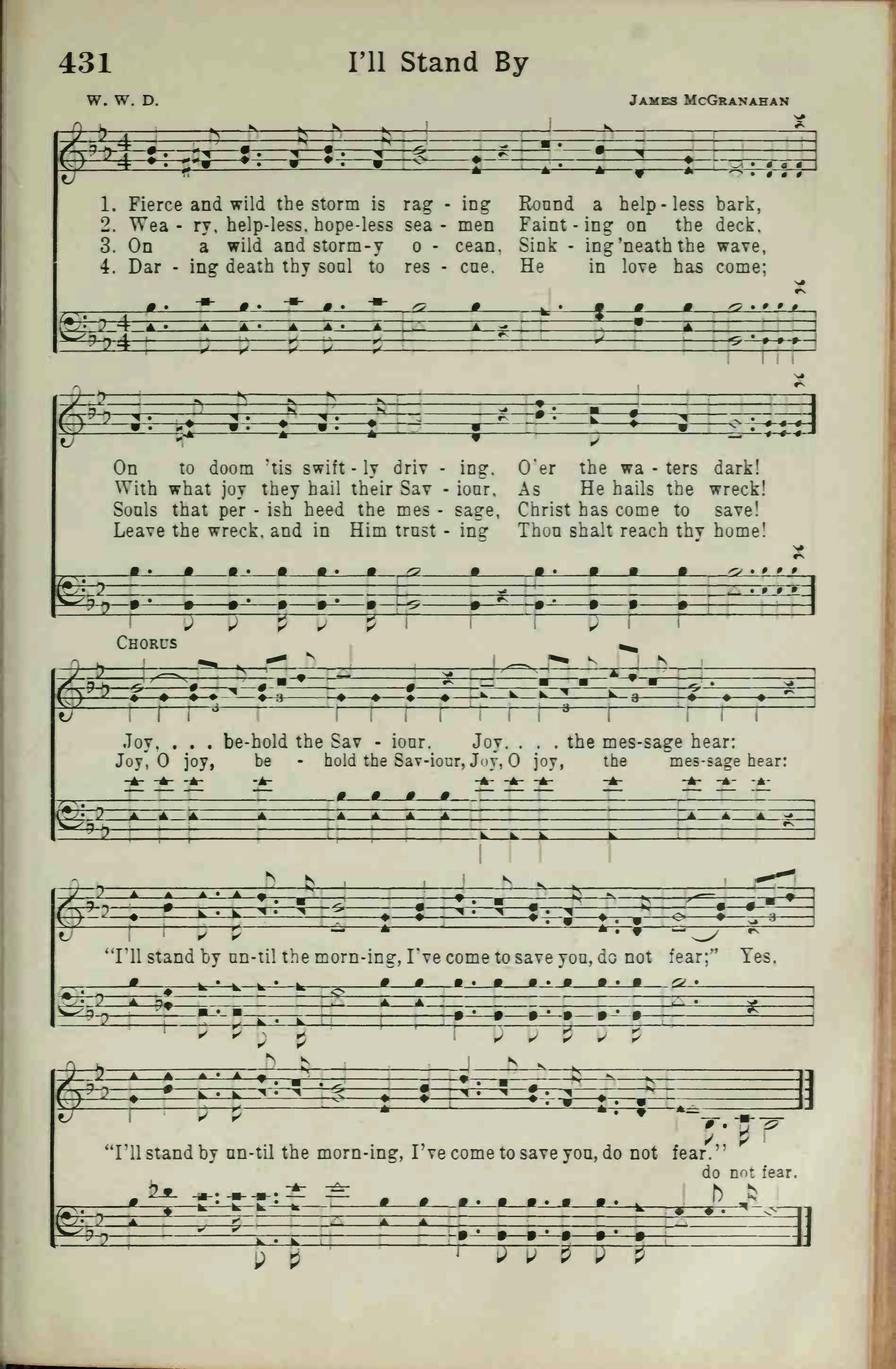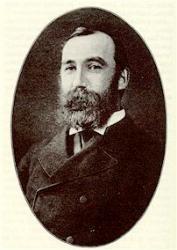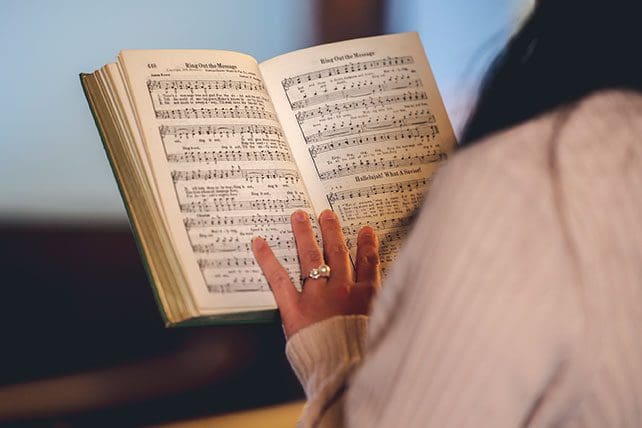I’ll Stand By Until the Morning
Lyrics
Round a helpless bark,
On to doom 'tis swiftly driving
O'er the waters dark!
Joy, behold the Saviour;
Joy, the message hear;
"I'll stand by until the morning;
I've come to save you, do not fear;"
Yes, I'll stand by until the morning;
I've come to save you; do not fear, do not fear.
Fainting on the deck,
With what joy they hail their Saviour,
As he hails the wreck!
Sinking neath the wave,
Souls that perish heed the message,
Christ has come to save!
He in love has come;
Leave the wreck, and in him trusting,
Thou shalt reach thy home!
Bible Reference
Psalm 107:2
About This Hymn
“Let the redeemed of the Lord say so, whom He hath redeemed from the hand of the enemy.” This powerful declaration from Psalm 107:2 (KJV) encapsulates the heart behind the gospel hymn collaboration between Daniel W. Whittle and James McGranahan. Both men, born in 1840, would go on to leave a lasting legacy in evangelistic hymnody during the late 19th century. With Whittle as the lyricist and McGranahan as the composer, their partnership produced numerous gospel songs still sung in churches today—songs that emphasize the power of redemption, personal testimony, and the joyful proclamation of salvation through Christ.
Daniel Webster Whittle, born on November 22, 1840, in Chicopee Falls, Massachusetts, lived a life marked by both military valor and spiritual devotion. At the age of 21, he enlisted in the 72nd Illinois Infantry, serving in Company B as a Second Lieutenant. He was later promoted to Major, serving under General O.O. Howard and participating in General William T. Sherman’s famed March to the Sea during the Civil War. Whittle was seriously wounded at the Battle of Vicksburg, and it was during his recovery that his heart began turning more fully to the Lord. After the war, while working briefly for the Elgin Watch Company, where he served as treasurer, Whittle came into contact with D. L. Moody, the great American evangelist. Encouraged by Moody, Whittle left the business world to enter full-time Christian ministry, quickly becoming one of the era’s leading evangelists.
Whittle rarely ministered alone. His early associate in gospel work was the celebrated hymn writer Philip P. Bliss, with whom he shared a fruitful partnership until Bliss’s tragic death in the Ashtabula train disaster of 1876. Following that loss, Whittle began working closely with James McGranahan, a skilled singer and composer who would become his primary musical collaborator. Many of Whittle’s more than 200 hymn texts were published under the pen name "El Nathan," and most of them were set to music by McGranahan. Moody, who valued the power of gospel music in his evangelistic campaigns, once said of Whittle, “I think Major Whittle has written some of the best hymns of this century.”
James McGranahan, born on July 4, 1840, near Adamsville, Pennsylvania, was a man of rare musical talent. Of Scotch-Irish descent, he was known from childhood for his exceptional tenor voice, which captivated listeners. Many urged him to pursue a career in opera, confident he would find great success on the stage. However, his heart was being drawn elsewhere. Encouraged by Philip Bliss to use his gift in the service of Christ, McGranahan hesitated until tragedy spurred him into action. When news reached him of Bliss’s death in the Ashtabula train wreck, McGranahan immediately traveled to the crash site. Although Bliss’s and his wife’s bodies were never recovered, McGranahan found their trunk intact, inside which was a hymn text Bliss had been working on titled “My Redeemer.”
At the crash site, McGranahan also met Major Whittle for the first time. Despite having never previously met, the two men were already familiar with each other's reputations. Bliss had often spoken to both of them about one another, expressing hopes that McGranahan would one day enter Christian ministry full-time. Moved by the moment and inspired by Bliss’s unfinished work, Whittle urged McGranahan to become the gospel singer and composer who would continue Bliss’s legacy. McGranahan accepted the call. He immediately set the poem “My Redeemer” to music and introduced it at the next evangelistic meeting in Chicago, where it made a powerful impression. That encounter marked the beginning of a long and fruitful partnership between Whittle and McGranahan—one that produced some of the finest gospel songs of the era.
Together, they traveled across the United States and to Great Britain, conducting evangelistic crusades and winning countless souls for Christ. Their hymns combined biblical depth, heartfelt emotion, and musical accessibility. Whittle’s texts reflected his military discipline, theological clarity, and personal experience with redemption, while McGranahan’s melodies offered memorable, singable expressions of the gospel message. The hymn “My Redeemer” became one of their most popular, joining a long list of gospel songs that would be used in revivals, church services, and personal devotion.
In later years, McGranahan’s health began to fail, prompting his retirement from active evangelistic work around 1890. Yet even in retirement, he remained devoted to composing gospel hymns, faithfully serving the Master he loved. He died on July 9, 1907, at the age of 67, holding firm to the promise of John 6:47—“He that believeth on me hath everlasting life.” His legacy as a gospel composer includes not only collaborations with Whittle but also original compositions like “My Redeemer”, which continues to minister to hearts today.
Daniel W. Whittle passed away a few years earlier on March 4, 1901, at the age of 61, in Northfield, Massachusetts, where he had spent his final years. His life, marked by courage on the battlefield and conviction in the pulpit, exemplified faithful service. Through his writing, Whittle left behind a treasure trove of gospel hymns that reflect the redemptive power of Christ and the believer’s call to testify of His grace.
Together, Whittle and McGranahan helped shape the sound and theology of American gospel music. Their collaboration brought together heart and melody, truth and testimony—forever echoing the call of Psalm 107:2: “Let the redeemed of the Lord say so, whom He hath redeemed from the hand of the enemy.”


📬 Subscribe to Our Devotional Updates
Receive weekly hymns, devotionals, and website features directly in your inbox.
Hymn Information

- Category: Hymn
- Author/Writer: D. W. Whittle (1890)
- Added: June 19, 2025
- Last Updated: June 19, 2025
- Views: 859
To view the author's biography, click their name above.
MIDI File
Popular Hymns
Recent Blog Posts
Popular Blog Posts
Visit Us on Social Media
Latest from X (Twitter)
Tweets by HymnalLibraryLatest from Facebook
Latest on YouTube
Daily Bible Verse
Disclaimer
The hymns, sheet music, MIDI files, and related content on this website are provided for educational and research purposes only.
- Public Domain: Many of the hymns featured here are in the public domain and may be freely used.
- Copyrighted Works: Some hymns may still be under copyright protection. Where applicable, permission has either been requested from the copyright owner, or the content is shared under the principles of fair use for educational purposes.
⚠️ Important Notice: If you wish to reproduce, distribute, or use any copyrighted hymn beyond personal study or educational use, you must obtain permission directly from the copyright holder. This website does not grant any rights for commercial use yet.
If there is any other question please address it to us in our Contact Page, for further assistance. Thank you for using the site. May God Bless You.














